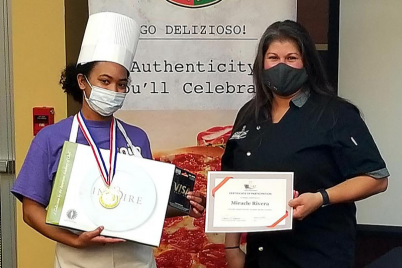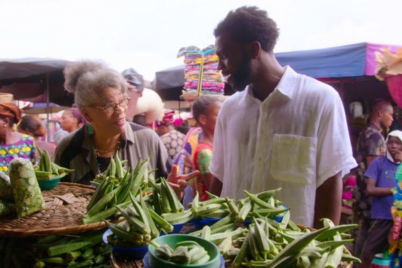Chef Gabrielle E. W. Carter will share her knowledge of African diasporic cooking, culture, and history at the 2022 Publix Tampa Bay Collard Green Festival this Saturday from 10-5 p.m. at the Carter G. Woodson African American Museum, 2240 9th Ave. S.
BY JOYCE NANETTE JOHNSON, Staff Writer
ST. PETERSBURG — Gabrielle E. W. Carter, featured on Netflix’s “High on the Hog: How African American Cuisine Transformed America” documentary, will be this year’s headliner at the 2022 Publix Tampa Bay Collard Green Festival.
The documentary is based on Jessica B. Harris’s book of the same name and explores the historical significance, development, and diverse contributions that Black people have contributed to American cuisine.
As stylish as they are, Carter wears many hats. She is a writer and storyteller whose work has appeared in the New York Times, Wall Street Journal, Garage Magazine, and Smithsonian Magazine. Her reflections and recipes on the art of cooking over an open fire are documented in her article “At the Hearth of it.”
Carter has been featured in Saveur, The Kitchn, and Crop Stories. She is a griot who combines cooking while exploring the history of diasporic food and culture during community dinners to keep African-American heritage alive.
Carter doesn’t call herself a chef. However, she has an online journal and recipe archive called “Revival Taste Collective,” which follows her self-discovery journey back to her ancestral land in Apex, N.C., and chronicles the recipes of long-ago generations.
She is also a community activist. When the pandemic hit, she mobilized local farmers in North Carolina into a cooperative called Tall Grass Food. This outreach program was developed to support Black farmers by assisting them in gaining better access to local markets.
With her partner Derrick Beasley and friend Gerald Harris, the program has expanded into Tall Grass Food Box, a community-supported agriculture model that distributes fresh food in the community.
More accurately, Carter has been described as a “cultural preservationist” and multi-layered artist who combines various forms of mixed media to explore, research, confirm, and document Black history and cuisine.
In 2018, she said she was inexplicably drawn back to her ancestral home in Apex, N.C., that her great-grandfather purchased many years ago. She remembered the past stories shared by her grandfather Mayfield and his brothers Herbert and Andrew.
She said the yearning to return home was ordained and that she needed to learn from them about their regional history. Carter wanted to record that history and worried they might not be here much longer to share those precious memories, knowledge, farming, and unique cooking techniques and recipes.
Once there, that search led Carter to start community dinners. This was an opportunity to bring people together to facilitate open communication about their personal and family history while sharing fresh food from the area and turning it into tempting and unique dishes.
“I’ve seen such a resurgence of Black American folk connecting to food, land, and spiritual practices from the Continent,” shared Carter. “I think every generation has their big Sankofa moment, but ours feels so intense because of our access to culture through streaming and social media.
“We’ve also recognized the importance of community and self-sufficiency during this pandemic, which has created an urgency for some to return to these knowings. There’s definitely been an awakening for our generation that calls for groundnut stews and West African grains.”
In the Netflix documentary, Carter shares a family story unfolding in many Black communities all over the country: eminent domain. This law allows the government to “buy” personal property, supposedly for the betterment of the masses, whether the homeowner wants to sell or not.
St. Petersburg has had two vibrant, successful Black neighborhoods torn asunder by the city government: 22nd Street Corridor and the Gas Plant/Laurel Park neighborhoods. Also known as the Black Wall Street, the 22nd Street Corridor had a highway run through it, erasing thriving Black businesses and homes.
The Gas Plant/Laurel Park community met a similar fate when it was razed to make room for Tropicana Field. Again, hundreds of homes, businesses, churches, and schools were eradicated, erasing any generational wealth.
Part of Carter’s family land has been taken to make way for a seven-lane highway. In the documentary, Carter states: “The land was undesirable when my family purchased it, and we nurtured it, and now it’s time to go.”
As a form of resistance, she stated that the remaining land will still be cultivated and bring joy and creativity forward.
“My biggest hope for us to take away from “High on the Hog” is to remember that we do have food culture. That we not only supported American Cuisine — both as growers and cooks — but also shaped it and seasoned it. We used ancient technologies and oral tradition to cultivate the land and feed our families and communities.
“We’ve always used food as a tool of liberation and continue to. We know these things, but shows like “High on the Hog: How African American Cuisine Transformed America” help us remember and see them at work now.”
Carter will be sharing her knowledge of African diasporic cooking, culture, and history at Collard Green Festival this Saturday. Samples of her recipe “Florida Gulf Style Groundnut Stew with collards, Florida Conch Peas and Prawns” will be available, and there will be question and answer opportunities.
The 5th Annual Tampa Bay Collard Green Festival takes place on Feb. 19 from 10-5 p.m. at the Carter G. Woodson African American Museum, 2240 9th Ave. S.
Visit www.tbcgf.org for more information.
TBCGFchallengerad






